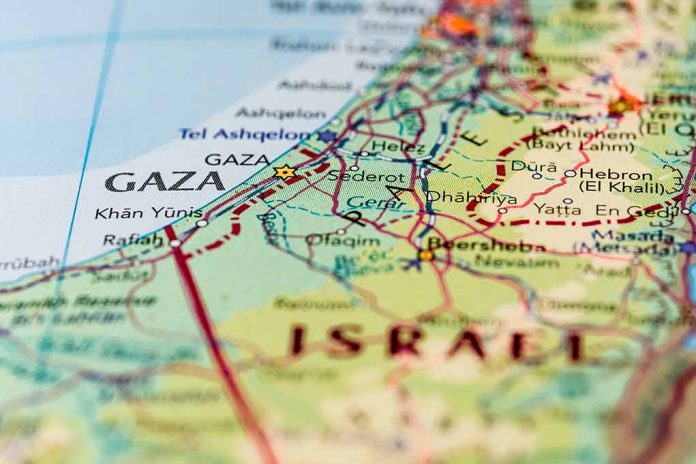
France is preparing to officially recognize a Palestinian state within months, potentially reshaping Middle East peace negotiations as President Emmanuel Macron advances his diplomatic agenda despite potential fallout with Israel.
Top Takeaways
- France plans to recognize a Palestinian state as early as June 2025, potentially becoming the most significant European power to do so
- Macron aims to chair a peace conference with Saudi Arabia where mutual recognition between Palestine and Israel would be a central goal
- Nearly 150 countries already recognize a Palestinian state, with Ireland, Norway, Spain, and Slovenia joining recently
- France’s move may strain relations with Israel while bolstering its standing among Arab nations
- Macron explicitly rejected former US President Trump’s suggestion to turn Gaza into a “Riviera” and relocate Palestinians
France’s Diplomatic Shift on Palestinian Statehood
President Emmanuel Macron has announced France’s intention to formally recognize a Palestinian state in the coming months, potentially at a United Nations conference in New York this June. This diplomatic initiative marks a significant policy shift for France, which has traditionally supported a two-state solution but stopped short of formal recognition. Macron, during his recent visit to Egypt, made clear that France sees Palestinian statehood as a crucial element in advancing meaningful peace negotiations in the region, even as the Israel-Hamas conflict continues to rage in Gaza.
“We must move towards recognition, and we will do so in the coming months,” Macron stated plainly, signaling France’s commitment to this diplomatic course. The French president emphasized that his country aims to chair a conference with Saudi Arabia where multiple parties would finalize “mutual recognition” between Palestinian and Israeli entities. This approach reflects France’s attempt to balance its historical support for Israel’s security with growing international pressure to advance Palestinian sovereignty.
President Macron and Saudi Crown Prince MbS to lead a June summit on establishing a Palestinian state.
Macron: Recognition must come at the "right moment" for mutual progress.⬇️
— The New Arab (@The_NewArab) December 4, 2024
International Context and Regional Implications
France would join nearly 150 countries that already recognize a Palestinian state, including recent additions like Ireland, Norway, Spain, and Slovenia. However, as one of Europe’s most influential powers, France’s recognition carries particular diplomatic weight. The United States, Israel’s strongest ally, has consistently resisted such recognition, maintaining that Palestinian statehood should emerge from direct negotiations between Israelis and Palestinians rather than through unilateral international actions.
Macron’s stance appears designed to clarify France’s position against entities that deny Israel’s right to exist, such as Iran, while simultaneously committing to Palestinian sovereignty and regional security. During his talks in Egypt with President Abdel Fattah al-Sisi and Jordan’s King Abdullah II, Macron explicitly opposed any forced displacement of Palestinians or annexation of territories in Gaza and the West Bank, reinforcing France’s commitment to established international boundaries.
Rejecting Simplistic Solutions
The French president took a direct stance against US President Donald Trump’s recent suggestion about turning Gaza into a “Riviera of the Middle East” and relocating Palestinians. Macron dismissed such ideas as overly simplistic, emphasizing instead the complex work of saving lives, restoring peace, and negotiating a lasting political framework for the region. His approach reflects France’s attempt to position itself as a serious diplomatic player focused on realistic, multilateral solutions.
Palestinian minister Varsen Aghabekian Shahin has welcomed France’s potential recognition as a positive step toward affirming Palestinian rights and advancing the two-state solution. For France, the move represents a delicate balancing act – maintaining its traditional support for Israel’s security while responding to changed regional dynamics and growing international consensus on Palestinian statehood. The recognition, if formalized in June, would mark a significant milestone in France’s Middle East policy and potentially influence other European nations still undecided on Palestinian recognition.






















